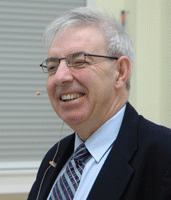Knighthood Means Psychiatrist is Now ‘Sir’ Robin
Abstract
Robin Murray, M.D., a leading British psychiatrist and expert on schizophrenia, was awarded a knighthood for services to medicine in the Queen of England's New Year's Honours List 2011.

Robin Murray, M.D.
Sir Robin Murray, as he may now properly be called, is a professor of psychiatric research at the Institute of Psychiatry, King's College, University of London. Murray is currently Britain's most highly cited psychiatry researcher, and he is the third most highly cited researcher in schizophrenia in the world, according to the Institute of Psychiatry.
Murray was previously dean of the Institute of Psychiatry and is best known for his work studying the causes of schizophrenia. In 1987 he and Shôn Lewis, M.D., were among the first to suggest that schizophrenia might in part be a neurodevelopmental disorder.
While he has acknowledged that "genetic factors are most important," he has, along with highly regarded colleagues, also demonstrated the important role of environmental factors, including obstetric events and other early childhood hazards, in the causation of schizophrenia. Later, they showed the contribution of social adversity to the high rates of schizophrenia in African-Caribbean people living in the United Kingdom.
Most recently, Murray and his colleagues have shown that prolonged heavy abuse of cannabis contributes to the onset of psychosis, and they are researching why some people are especially vulnerable to that commonly used drug. Murray told Psychiatric News, "That's why I've become known to the public—my research into why heavy use of cannabis, such as smoking it every day for five years, increases the risk of schizophrenia. This has had a big public impact."
At the same time, Murray maintains an active schedule of teaching and clinical work. He is dedicated to nurturing young researchers and has supervised more than 60 graduate students, many now senior academics around the world, in their attainment of higher research degrees. He is also currently the director of the master's program in psychiatric research at the Institute of Psychiatry.
In addition to his teaching and research activities, he assesses and treats patients at the National Psychosis Unit of the South London and Maudsley National Health Service Trust, to which people are referred from across the United Kingdom.
Peter Buckley, M.D., a professor of psychiatry and dean at the Medical College of Georgia, who knows Murray well, told Psychiatric News, "The knighthood is testimony to the quality of Robin's work, his impact, and phenomenal output. More than that, he has been a very generous academic mentor and is truly a beloved figure in our field."
About his knighthood, Murray told Psychiatric News, "Obviously, I'm very pleased indeed. It's not common for doctors to be knighted, perhaps two or three each year. Several other psychiatrists have received the honor."
He admitted that his new status does present a small social conundrum—now when he makes a reservation at a restaurant or with an airline, he has to decide whether to identify himself as "Mister," "Doctor," or "Sir." At British Airways, he said, he recently tried for the first time to use the title "Sir." "It was the first time my booking was ever refused," Sir Robin said.



